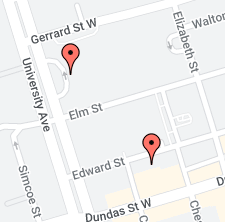Hearing loss can be categorized into three different types. These include: sensorineural, conductive and mixed. Hearing loss stems from the different parts of the auditory system which have been affected.
A sensorineural hearing loss mostly occurs within the inner ear where there may be nerve damage which alters the brain response. This type of hearing loss is mostly permanent and usually cannot be corrected with any medications or surgery. Generally, causes of sensorineual hearing loss include: hereditary hearing loss, presbycusis (hearing loss due to getting older), Meniere’s Disease, toxic drugs, exposure to loud noises for a long period of time, Acoustic Neroma, extensive head trauma, and/or viral illnesses.
A conductive hearing loss mostly occurs when sound does not travel effectively through the ear canal and ossicles of the middle ear. Generally, causes of conductive hearing loss include: Otitis Media (ear infections), Serous Otitis Media (allergic reactions), fluid found in the middle ear, excessive cerumen blocking the ear canal, Otitis Ecxterna (commonly known as Swimmer’s Ear), foreign objects in the ear canal, perforation of the ear drum and/or scarring.
A mixed hearing loss mostly occurs when there is both a sensorineural and conductive hearing loss present. This would typically suggest issues within the middle and inner ear. There are also auditory processing problems in the brain that can affect how sound is interpreted. This can cause problems of hearing in background noise, even with appropriate hearing aids.
Age-Related Hearing Loss
As you get older, you inevitably experience different changes in your body along with the way it functions. Hearing loss can sometimes be one of these occurrences. Hearing loss due to aging is a common condition that affects many adults and seniors. In fact, it is said that 1 in 2 adults over the age of 65 have some varying level of hearing loss. Hearing loss related to aging is also referred to as presbycusis. While age-related hearing loss won’t threaten your life, it can have a substantial influence on the quality of your life if nothing is done about it.
What Contributes to Age-Related Hearing Loss?
Age-related hearing loss takes place slowly with time. Numerous changes in the inner ear can contribute to the condition. Such alterations include:
- Changes in the configuration of the inner ear
- Changes in blood flow to the ear
- Damage in the nerves responsible for hearing
- Fluctuations in the way that the brain processes speech and sound
- Harm present to the tiny hairs in the ear that are responsible for communicating sound to the brain
Additional issues can lead to age-related hearing loss as well, such as:
- Poor circulation
- Diabetes
- Loud noises
- Certain medications
- Family history of hearing loss
- Smoking
Detecting the Beginning of Age-Related Hearing Loss
Signs of age-related hearing loss normally begin when it is evident that one is having extreme difficulty with hearing high-pitched sound. You may realize that you are having trouble hearing a child’s voice or a female voice. Sometimes you’ll also find it challenging to hear background noises or others simply speaking clearly.
Additional Symptoms that Occur Include:
- Overly loud sounds in some circumstances
- Challenges hearing clearly in noisy spaces
- Trouble deciphering the difference between “s” and “th” sounds
- Ringing in the ears
- Increasing the volume on the television or radio louder than usual
- Requesting that someone repeat what they have said
- Incapable of understanding telephone conversations
Causes of Hearing Loss in Adults
Adults experiencing hearing loss may be either hereditary or developed due to illness, ototoxic (ear-damaging) drugs, experiencing loud noise, tumors, head injuries, or simply a part of the aging process. This loss may take place on its own or directly alongside tinnitus; noticeable ringing in the ears.
Other Causes of Hearing Loss in Adults Include:
Otosclerosis: This disease affects the middle ear, targeting the tiny bones situated in the middle of the ear. Otosclerosis can lead to the development of conductive hearing loss, which is often treated through surgery.
Ménière’s disease: This disease targets the inner ear. The source of Ménière’s disease is still a mystery, though it typically will occur between the ages of 30 and 50. A person with Ménière’s disease will usually experience a combination of sensorineural hearing loss, dizziness (vertigo), ringing in the ear, and sensitivity to excessively loud sounds. This form of hearing loss is handled by a doctor and audiologist. Some individuals with Ménière’s disease speak of mild symptoms, but some adults will have more concerning symptoms. Hearing can come and go, but with time you’ll eventually experience permanent hearing loss.
Autoimmune inner ear disease: This is a sudden-onset form of hearing loss. It occurs quickly and can be extremely dramatic. This should be medically treated right away to reduce the level of hearing loss that one may incur.
Ototoxic medications: Certain drugs that are considered to be otoxic are
- Aminoglycoside antibiotics (streptomycin, neomycin, or kanamycin)
- Salicylates in mass quantities (aspirin)
- Loop diuretics (lasix or ethacrynic acid)
- Drugs that may be in chemotherapy treatments (cisplatin, carboplatin, or nitrogen mustard)
Acoustic neuroma: This is a type of tumor that can lead to hearing loss. Symptoms can include hearing loss or ringing in one ear along with a sense of feeling full. Medical treatment is required for acoustic neuroma.
Physical head injury: A head injury can contribute to traumatic brain injury (TBI), skull fractures, a hole present in the eardrum, and injury to the middle ear structure, which ultimately leads to hearing loss.
Presbycusis: This is a sensorineural hearing loss that takes place over time later in life. The condition targets both ears and speech will start to sound muffled and hard to understand because the ability to hear high pitch noise is lost first with this condition.



